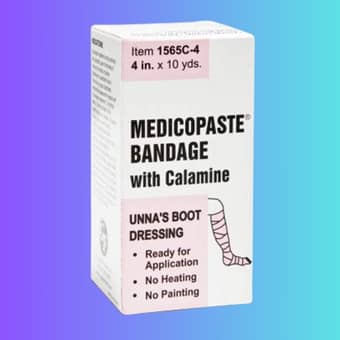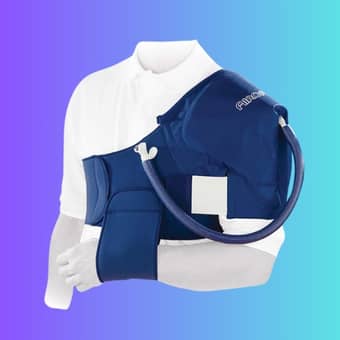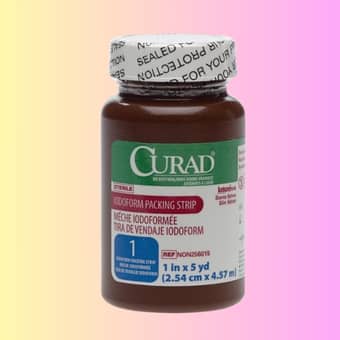You may have heard the term “empty calories” in discussions about nutrition and weight. These calories give energy, but they don’t have important nutrients. This can cause bad eating habits and may lead to weight gain. Knowing what empty calories are is key to healthier eating. They can affect your body in significant ways. In this post, we’ll explore empty calories. We’ll look at where they come from and how they affect your weight. This will help you make better choices for your health.
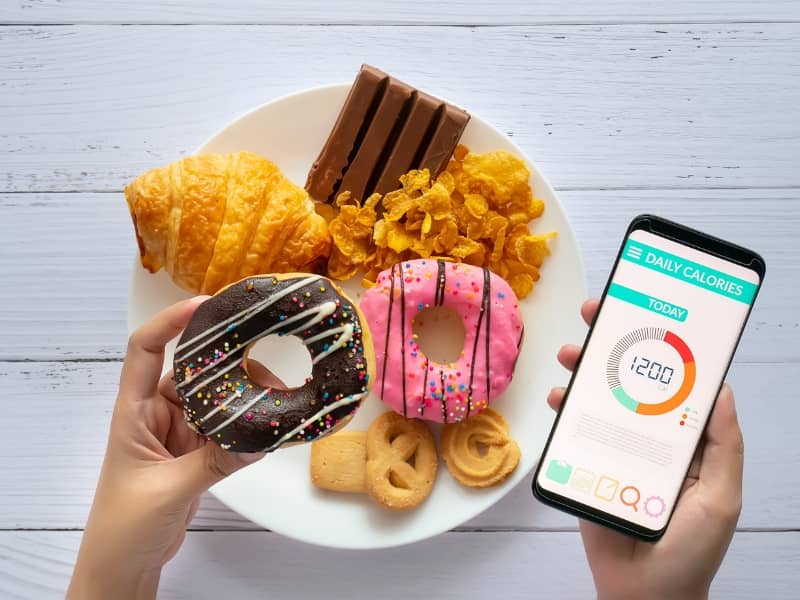
Table of Contents
- I. Definition of Empty Calories
- II. The Impact of Empty Calories on Weight Management
- III. Empty Calories vs. Nutrient-Dense Foods
- IV. Strategies for Reducing Empty Calorie Consumption
- V. The Psychological Aspect of Eating Empty Calories
- VI. Long-Term Health Implications of Consuming Empty Calories
- The Truth About Empty Calories and Weight Management
- FAQ
Key Takeaways:
-
Empty calories are foods and drinks that are high in calories but low in nutrients. They lack vitamins, minerals, and fiber.
-
Empty calories often come from sugary drinks, candy, processed snacks, and fast food.
-
Eating empty calories can make you gain weight. They add more calories but don’t make you feel full.
-
Eating foods with empty calories can hurt your nutrition. This also raises your risk of chronic diseases.
-
Eating nutrient-dense foods helps balance calories. This can lead to better weight management and improved health.
I. Definition of Empty Calories
Before diving deeper, it’s imperative to understand what empty calories are. Empty calories are foods and drinks that have few nutrients but are high in calories. These items usually have too much added sugar and unhealthy fats. They add calories to your diet, but they lack vitamins, minerals, and nutrients. Your body needs these to function well.
1.1. What Are Empty Calories?

Empty calories come from foods and drinks that lack essential nutrients. Eating these calories might make you feel full for a bit, but they don’t help your health. This can cause weight gain and lead to nutritional gaps over time.
1.2. Sources of Empty Calories
Below are some common sources of empty calories that you might encounter in your daily diet. These include sugary drinks, fast food, unhealthy snacks, and sugary desserts. These foods taste great, so you might eat a lot without noticing how they harm your health.
It’s important to see how these empty calories fit into your diet, even if you enjoy them. Snacks like potato chips and sugary drinks might look tempting. But, eating too much of them can lead to weight gain and health problems. Knowing these sources helps you make better choices. You can focus on balanced meals that offer important nutrients. This leads to improved health.
II. The Impact of Empty Calories on Weight Management
Eating empty-calorie foods can harm your weight management. This can happen even if you consume enough calories. These foods usually have few nutrients but are high in calories. This can cause weight gain over time. If you eat a lot of sugary snacks and drinks, your body might miss out on important vitamins and minerals. This could make you feel hungry again as you try to meet your nutritional needs.
2.1. How Empty Calories Contribute to Weight Gain
High sugar and unhealthy fats in empty-calorie foods can cause cravings. This often leads to overeating. The more you snack, the less satisfied you may feel. This can lead you to eat even more. This cycle causes an imbalance in your calorie intake. It can lead to unwanted weight gain, regardless of your efforts to eat healthily.
2.2. The Role of Nutrient Deficiency

Weight gain often comes with nutrient deficiencies. This can make your health issues even worse. Filling your plate with empty calories means your body misses out on vital nutrients. These nutrients are essential for good metabolism and energy production. You might feel tired, have a weak immune system, or face mood swings. These issues can push you to crave unhealthy foods, making bad eating habits worse.
When your body lacks nutrients, it can cause cravings for more food. This often leads you to pick calorie-rich options that don’t offer much nutrition. This can start a bad cycle. It makes it hard to manage your weight well. Eating a balanced diet full of whole foods is key. It helps you maintain a healthy weight and boosts your well-being.
III. Empty Calories vs. Nutrient-Dense Foods
Understanding empty calories versus nutrient-dense foods helps you choose better foods. Empty calories are in processed snacks and sugary drinks. They offer little nutrition. Fruits, veggies, and whole grains are nutrient-dense. They are full of vitamins and minerals. They provide important nutrients your body needs. Choosing nutrient-dense foods can improve health and help manage weight better.
3.1. Understanding Nutritional Value
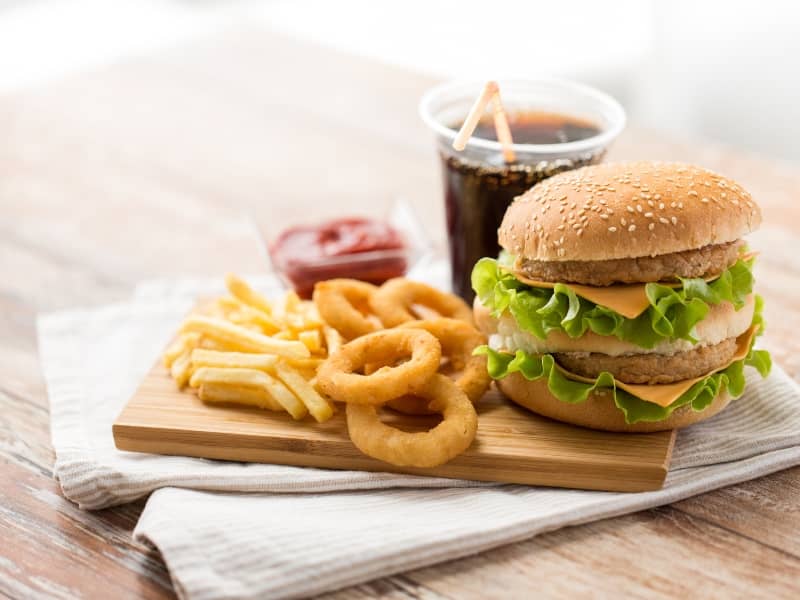
Empty calories provide energy but have little nutritional value. They derive primarily from added sugars and unhealthy fats. Nutrient-dense foods pack vitamins, minerals, fiber, and other vital nutrients. They help your body function well. Eating nutrient-rich foods can boost your health and well-being. This helps you get the nutrients you need to thrive.
3.2. Benefits of Nutrient-Dense Choices
People around the world who eat nutrient-dense foods often have better health. They also find it easier to maintain a healthy weight. Nutrient-dense foods keep you full longer. This helps prevent overeating and reduces snacking on unhealthy options. They help manage weight. They give your body the nutrients it needs without extra calories.
Eating nutrient-rich foods like leafy greens and lean proteins boosts energy and health. Whole grains also play a key role. Choosing these nutrient-dense options fuels your body better. You’re also making important progress toward your weight goals. Adding different foods to your meals can help you have a balanced diet. This can lead to lasting health and energy improvements.
Learn more Ketogenic Diet Benefits>>>
IV. Strategies for Reducing Empty Calorie Consumption
A few smart changes to your diet can help cut down on empty calories. Focus on whole foods like fruits, veggies, lean proteins, and whole grains. Limit processed snacks and sugary treats. Also, being mindful of portion sizes can help control how much you eat. Drinking water instead of sugary drinks can provide significant benefits as well.
4.1. Identifying Hidden Empty Calories
One challenge in cutting down on empty calories is spotting them in foods that seem healthy. Many processed foods, sauces, and dressings have lots of sugars and unhealthy fats. These can add many calories to your diet but offer little nutrition. Reading nutrition labels helps you make informed choices. This way, you can avoid hidden traps.
4.2. Healthy Substitutes and Alternatives

Before changing your diet, try healthy substitutes. These can meet your cravings without adding empty calories. Choose fruit instead of sugary snacks. Use Greek yogurt in place of sour cream. Also, opt for whole-grain choices instead of refined grains. Small changes can improve your meals. They also help you stay healthy and cut calories.
It’s not about swapping foods. It’s about finding new flavors and textures. This can make your meals more satisfying and fun. Try herbs and spices to boost flavor without extra calories. You can also cook by grilling or roasting rather than frying. Embracing these healthy options helps you cut empty calories. You can still enjoy tasty and satisfying meals.
V. The Psychological Aspect of Eating Empty Calories
Your relationship with food is more than nutrition. It often includes emotions that might push you to choose empty calorie foods. Knowing these psychological factors helps you choose better foods and understand why. Being aware can help you build better eating habits. It can also reduce the temptation of quick-fix, low-nutrient foods.
5.1. Emotional Eating and Cravings
Emotional eating often fuels cravings for empty calories. This can happen due to stress, boredom, or habit. These feelings might make you pick sugary snacks or processed foods instead of healthier choices. This creates a cycle. You feel good for a moment, but then guilt or disappointment follows. Noticing your emotions can help you escape this pattern. Then, you can make better food choices.
5.2. Mindful Eating Practices

Recognizing your emotional triggers is the first step. Mindful eating can significantly enhance your feelings toward food. This method helps you enjoy every bite. It also teaches you to notice your hunger signals. You can then make better food choices based on your body’s true needs rather than on emotions.
Slow down, remove distractions, and enjoy your meals. This way, you’ll notice what you eat better. Focusing on flavors, textures, and satisfaction helps you connect more with your food. Mindfulness can help cut cravings for empty-calorie snacks. This lets you choose foods that nourish your body and mind over time.
VI. Long-Term Health Implications of Consuming Empty Calories
Empty calories may feel good at first, but eating them too often can lead to serious health issues later. Eating many high-calorie, low-nutrient foods can increase your risk of weight gain, metabolic syndrome, and other health issues. Choosing nutrient-rich foods is key to your health. They help your body work well over time.
6.1. Chronic Diseases Linked to Empty Calories
Eating a lot of empty calories over time can raise the risk of chronic diseases. These include type 2 diabetes, heart disease, and some cancers. Poor nutrition often causes these diseases. This can lead to weight gain, inflammation, and other harmful effects on your body. Eating more nutrient-rich foods can lower these risks and boost your health.
6.2. Importance of Balanced Nutrition

On your path to better health, balanced nutrition plays a significant role. Eating a variety of whole foods like fruits, veggies, whole grains, lean proteins, and healthy fats provides key nutrients. These nutrients support your body’s functions. Eating a varied diet helps you maintain a healthy weight. It also boosts your immune system, increases energy, and improves your well-being.
For balanced nutrition, fill your plate with colorful fruits and veggies. They’re full of vitamins, minerals, and antioxidants. Include whole grains and lean proteins to provide sustained energy throughout the day. Healthy fats, such as those found in avocados and nuts, are also vital for brain function. Choose nutrient-rich foods with careful consideration. This helps you create a healthier lifestyle. It also supports better long-term health for your body.
The Truth About Empty Calories and Weight Management
Empty calories come from foods and drinks that have little to no nutrition. They consist primarily of sugars and unhealthy fats. These calories can cause weight gain. They often lead to eating more without filling you up. Choose nutrient-dense foods to manage your weight better. This way, you can enjoy a balanced diet. Understanding the impact of empty calories can empower you to make healthier choices.
FAQ
Q: What are empty calories?
Empty calories come from foods and drinks. They primarily provide energy from added sugars and unhealthy fats. They don’t have important nutrients like vitamins, minerals, fiber, and protein. Examples are sugary drinks, candies, pastries, and processed snacks. They add calories but don’t provide nutrition.
Q: How do empty calories affect weight?
Eating foods high in empty calories can cause weight gain. These foods have a lot of energy but don’t make you feel full. Overeating can happen when people eat more calories than they need. They may not feel satisfied. Also, these foods can make it harder to lose weight. They take the place of healthier, nutrient-rich foods in your diet.
Q: Can empty calories be part of a balanced diet?
You can include foods with empty calories in your diet sometimes, but moderation is key. Focus on nutrient-dense foods for better health. A diet high in empty calories can cause nutritional gaps and raise the risk of chronic diseases.
Q: What are some common sources of empty calories?
Common sources of empty calories are:
-
Sugary drinks, like soda and energy drinks, are unhealthy.
-
Alcoholic beverages
-
Sweets
-
Fast food
-
Processed snacks, such as chips and cookies.
These items are often high in sugar, unhealthy fats, or refined grains. This leads to too many calories.
Q: How can I reduce my intake of empty calories?
Eat whole foods to cut down on empty calories. Include fruits, vegetables, whole grains, lean proteins, and healthy fats in your diet. Checking nutrition labels helps spot foods with added sugars and unhealthy fats. Switching sugary drinks for water or unsweetened drinks can help cut empty calories. Choosing healthier snacks is another good strategy.
Learn more Ketogenic Diet Benefits>>>
Last Updated on August 5, 2025 by Holistic Healths



